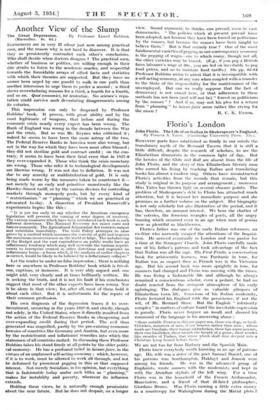Another View of the Slump
The Great Depression. (Macmillan. 80. 6d.)
By Professor Lionel Robbins.
EcoNoinsTs are in very ill odour just now among practical men, and the reason why is not hard to discover. It is that they so persistently contradict each other's conclusions. Who shall decide when doctors disagree ? The practical men, whether of business or politics, are willing enough in their dire straits to listen to the academic oracles, and respectful towards the formidable arrays of sifted facts and statistics with which their theories are supported. But they have no sooner been urged by one pundit to walk in one path than another intervenes to urge them to prefer a second ; a third shows overwhelming reasons for a third, a fourth for a fourth, and so on. Quot econotniei, tot sententiae. No science's repu- tation could survive such devastating disagreements among its votaries.
This impression can only be deepened by Professor Robbins' book. It proves, with great ability and by the most legitimate of weapons, that before and during the economic crisis nearly every expert has been wrong. The Bank of England was wrong in the decade between the War and the crisis. But so was Mr. Keynes who criticized it ; indeed he seems to have been the more astray of the two. The Federal Reserve Banks in America were also wrong, but not in the way for which they have been most often blamed ; they did not sterilize gold and contract credit ; on the con- trary, it seems to have been their fatal error that in 1927-9 they over-expanded it. Those who think the crisis monetary are wrong. Those who refer it to technological developments are likewise wrong. It was not due to deflation. It was not due to any scarcity or maldistribution of gold. It is only being made worse by the measures taken to counteract it— not merely by an early and primitive monstrosity like the Hawley-Smoot tariff, or by the various devices for controlling markets through monopoly pools, but by every kind of " restrietionism " or " planning " which we see practised or advocated to-day. A dissection of President Roosevelt's experiments begins like this :
" It is yet too early to say whether the American emergency legislation will prevent the coming of some degree of recovery. The various measures which have been introduced each work in such different directions. The National Recovery Act raises costs and fosters monopoly. The Agricultural Adjustment Act restricts output and subsidizes immobility. The Gold Policy attempts to raise prices by a method which increases the scarcity of gold and imposes the maximum inconvenience on the world at large. The unbalancing of the Budget and the vast expenditures on public works have an inflationary tendency which may well over-ride the various impedi- ments to enterprise created in other directions and engender an inflationary boom—a boom which, if the analysis of earlier chapters is correct, would be likely to be followed by a deflationary collapse."
Let the reader be under no false impression ; there is nothing here or anywhere in Professor Robbins' book which is frivol- ous, captious, or insincere. It is very ably argued and, one might add, very clearly and at times brilliantly written. He is seeking the truth, and it is not his fault if his conclusions suggest that most of the other experts have been wrong.. Nor is he alone in that view; for, after all, most of them hold it about each other. But it is unfortunate for the repute of their common profession.
His own diagnosis of the depression traces it to over- investment, occurring in the years 1927-9, and chiefly, though not solely, in the United States, where it directly resulted from
• the action of the Federal Reserve Banks in cheapening and over-expanding credit during that period. The evil thus , generated was magnified, partly by the pre-existing economic heresies of countries like Germany and Austria, but even more by the restrictionist and inflationist remedies into which the statesmen of all countries rushed. In discussing these Professor Robbins takes his stand firmly at all points by the older politi- cal economy. He has a profound belief in laisser-faire, in the Virtues of an unplanned self-acting economy ; which, however, if it is to work, must be allowed to work all through, and not be deformed by piecemeal pegging in this or that supposed interest. Not merely Socialism, in his opinion, but everything that is fashionable today under such titles as "planning," makes for instability and poverty, wherever its influence extends.
Holding these views, he is naturally enough pessimistic about the near future. But he does not despair, on a longer
view. Sound argument, he thinks, can prevail, even in vast democracies. "The policies which at present prevail have been adopted, not because they have been forced on politicians by the masses, but because the masses have been taught to believe them." But is that entirely true ? One of the most fundamental varieties of pegging in our contemporary economy is the pegging of wages—one to which many, though not all, the other varieties may be traced. (E.g., if you peg a British farm labourer's wage at 80s., you are led on inevitably to peg food prices, and so to institute food tariffs.) On pp. 82-84 Professor Robbins seems to admit that it is incompatible with a self-acting economy, at any rate when coupled with a transfer to the State of the responsibility for the maintenance of the unemployed. But can we really suppose that the fact of democracy is not causal here, or that adherence to these methods has not been (and will not be) "forced on politicians by the masses " ? And if so, may not his plea for a return from " planning " to laisser-faire seem rather like crying for






























 Previous page
Previous page